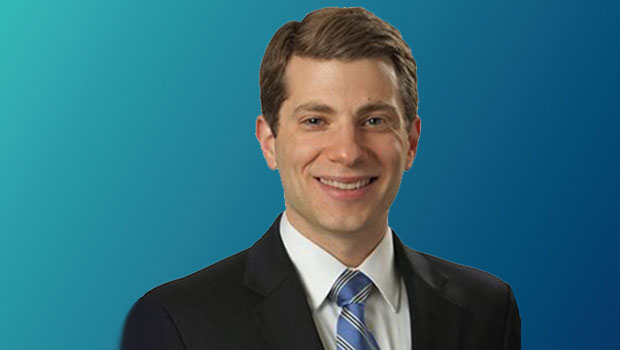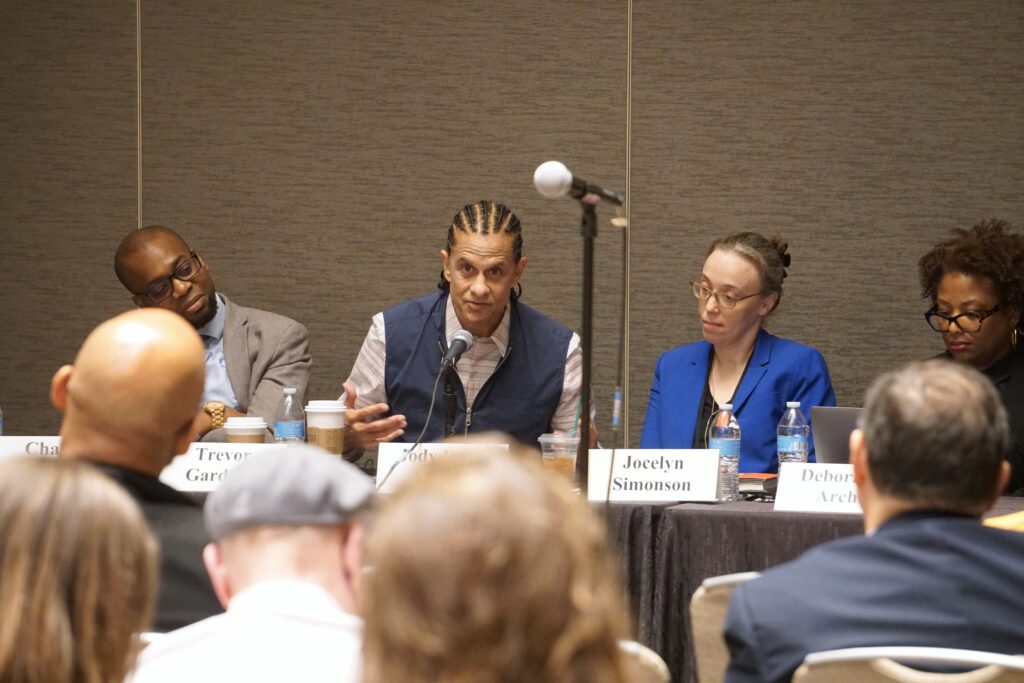AALS sections provide opportunities for law school faculty and staff to connect on issues of shared interest. Each section is focused on a different academic discipline, affinity group, or administrative area. For a full list of sections and information on how to join, please visit www.aals.org/sections.
As part of the ongoing “Spotlight on Sections” series, AALS sat down with the leadership of the Section on Financial Regulation and the Section on Jurisprudence.
By Zaena Ballon
The Section on Jurisprudence promotes the communication of ideas, interests, and activities among members and makes recommendations on matters of interest in the teaching and improvement of the law relating to jurisprudence and legal philosophy.
Chair: Matthew A. Shapiro, Rutgers Law School
Chair-Elect: Aditi Bagchi, Fordham University School of Law
What made you get involved with the section on jurisprudence and why did you decide to join the leadership?
Matthew A. Shapiro: I’m a proceduralist, so I focus my scholarship mostly on civil procedure but draw upon legal and political philosophy. I was eager to connect with others employing similar methodologies in their work, even if they are studying different areas of the law from the one I focus on. I joined the leadership mainly to give back or pay it forward. I benefited from talking to people at the AALS Annual Meeting in the section, so I wanted to help build and sustain the intellectual community that the section was helping to constitute.
Aditi Bagchi: My background is in contracts rather than civil procedure, but also in the private law space. It’s nice to connect with people engaged in legal philosophy in one form or another and not just scholars in the same subject area. Many groups are structured around subject matter, so it’s easy to connect with other contracts people for example. How to meet other people doing legal philosophy or jurisprudence is not as obvious.
It’s nice to have a ready mechanism for meeting scholars and keeping up with articles. It’s easy to neglect if you’re just working on your own thing all the time. That’s why having a section on jurisprudence is a good thing, even if many of its members are also involved in some other section that’s more specific to their subject matter. Many professors have more than one scholarly identity and I think my reasons for being involved in the leadership are the same as Matthew’s.


What is the section’s leadership structure?
MAS: We have four officers: a chair, a chair-elect, secretary, and treasurer. The three most recent past chairs serve on the executive board. The chair typically takes the lead on programming and so forth, but it’s a very collaborative process and all the officers try to work together as a group.
What kind of work do your members do?
MAS: The section tries to be a big tent. There are a few subfields or sub-methodologies incorporated into the section. Most narrowly, jurisprudence refers to the philosophical study of the nature of law. What are the grounds of legal validity? What’s the relationship between law and morality? So, there are people in our section who do that kind of work.
Jurisprudence can also refer to specific jurisprudence, which is a philosophical analysis of a particular area of law, contracts for example. There’s also what sometimes gets referred to as normative jurisprudence, which is the normative assessment of a particular area of law or a particular legal problem from the perspective of, say, moral philosophy.
Then, most broadly, there’s law and philosophy. This uses methods from the discipline of philosophy to analyze questions about the law and legal institutions. So again, the section encompasses people who do various kinds of work and people who don’t even think of themselves as doing any kind of philosophical work, who do more traditional legal scholarship, but nevertheless are interested in keeping up with philosophical work on the law.
How does your section support the scholarship of your members?
MAS: Throughout the year, we primarily support scholarship by calling attention to events of interest to the law and philosophy community, which may not show up through other channels. We rely on section members to forward those events to the leadership and disseminate them to the section.
Like other sections, we give several awards annually to recognize the scholarly contributions of people working in the law and philosophy space. The section also has a strong record of supporting junior scholars, particularly pre-tenure scholars. So we usually hold at least one event during the year to allow junior scholars to present and receive feedback on their work. And then there is the Annual Meeting, where we put together a panel that showcases cutting-edge work in law and philosophy that is also potentially of interest to people not necessarily thinking of themselves as legal philosophers.
AB: The section focuses on connecting people. The more you know about who else is writing, the more likely you are to read something that you might otherwise not have. That has payoffs for the richness of one’s own writing and being able to make connections across subject matter areas. Or, actually, the more legal philosophical work you read, the better your writing gets just because you see the way arguments go.
I don’t have a PhD in philosophy, so I learned this kind of writing while working as an academic. It’s essential to see examples of how this work can be done so you can find the different models that work for you and understand the wide range of possibilities.
What are some meaningful conversations happening right now in legal education regarding jurisprudence?
MAS: There are conversations on both the teaching and the scholarly fronts. On the teaching front, there’s an increased focus on issues of racial justice and students are displaying an increased interest in those issues. A rich discussion of those issues benefits from a philosophical perspective. These debates have been unfolding in moral, political, and legal philosophy literature for quite some time. Many professors are trying to bring those philosophical resources to these classroom debates.
On the scholarly front, there’s a renewed focus on the question of to what extent issues of general jurisprudence (again: questions about the nature of law and legal validity) are relevant to ordinary doctrinal debates. For example, in public law scholarship, several prominent scholars have been arguing that legal positivism, which is roughly the idea that legal validity is determined by social facts rather than the moral merits of the law, entails or requires a kind of textualist approach to statutory interpretation or an originalist approach to constitutional interpretation. That’s a very controversial claim, but it highlights this increased focus in recent public law scholarship, especially, on the connection between general jurisprudence and more doctrinal or methodological issues of legal interpretation.
AB: One way of thinking about the things we are debating, especially in terms of teaching, is similar to how people think about other areas. So, we could consider these three questions: how much, how current, and what counts? How much airtime should jurisprudential questions get relative to what many people consider the core of legal education? What we teach should train students practically in the law and give them skills they will use in practice. Like other more academic aspects of legal education, jurisprudence has to justify itself and the time and resources it gets vis-a-vis other more practically-oriented aspects of legal education.
“How current” means that some strands of jurisprudence have been on the table for thousands of years. Like what is law? Must you obey it? Things like that. Then some topics are more current. They were always there, or should have been, but they didn’t get as much time. This includes questions about racial justice. One of the questions in the context of legal education is how much do you emphasize the topics that are the traditional core of jurisprudence over time? To what extent do you update the curriculum to reflect students’ interests and what we may perceive today as the most urgent questions?
Then finally, “what counts” is vital for scholarship, but in the context of legal education: what kinds of writings, subject matters, or topics are properly regarded as jurisprudential, and does it matter? The one context where it arguably does matter is when you’re teaching a course and you have to decide whether you will include it on the syllabus. I think some of the writing on questions that are of philosophical interest doesn’t necessarily have the same style or form as the writing on some more traditional questions, but that doesn’t mean that it’s not correctly regarded as jurisprudential, but it doesn’t look like jurisprudence writing from 50 years ago. It takes longer to recognize that it’s also jurisprudence and that it self-consciously is rejecting some of the tropes or way of arguing that we are familiar with from earlier forms of jurisprudence.
These are questions that many AALS sections, especially methodological sections, have to face.

The section on jurisprudence hosts a mentorship program. Can you tell us more about it?
MAS: At least as long as I’ve been a professor, the section has really been committed to nurturing junior scholars, both pre-tenure, tenure track scholars and also fellows and VAPs and people thinking about going on the law teaching market. A couple of years ago, there was a more formal mentoring program designed to link more senior scholars with junior scholars. In the last couple of years, there wasn’t enough interest to sustain that formal program, but the commitment to nurturing junior scholars continues. In August, the section hosted a virtual workshop specifically designed for pre-tenure scholars where selected pre-tenure scholars presented a paper, got feedback from a commentator, and took questions from the other participants. The hope is that junior scholars will have an opportunity to get feedback on their work and establish more informal connections, even if it doesn’t take the form of formal mentorship.
At the AALS Annual Meeting, you held a book roundtable for Tommy Shelby’s The Idea of Prison Abolition. What themes did the session address?
MAS: Tommy Shelby is a professor of African-American studies and philosophy at Harvard. In the book, he takes up arguments for prison abolition, the abolition of incarceration. He covers the debate between those calling for abolition and those arguing for more incremental reforms in the criminal justice system. The book is sympathetic to the abolitionist view while acknowledging the practical impediments to implementing that vision.
He ends up arguing that the abolitionist vision, although somewhat utopian, can nevertheless inform reform efforts. So, Professor Shelby discussed his book and several very prominent law professors working in the criminal justice space addressed arguments about abolition in their work. A lively discussion ensued, but the event nicely illustrated that the jurisprudence section isn’t just about legal philosophers getting together and doing philosophy. It’s also about building connections between people doing more philosophically inclined work with folks engaged with doctrine and policy.
What are the best ways for interested faculty to get involved with this section?
MAS: Participating in section events is the biggest one. We had the virtual junior scholars’ workshop in early August. The section will also have a panel at the Annual Meeting, and then we’re always interested to hear new ideas for programming. For those reading this, feel free to contact any section officers with ideas.
What is your vision for the section this year and in years to come? What new initiatives, project-based or ongoing, would you like to see as part of this section?
MAS: For me, there are two main goals. One is to continue and deepen the programming to support junior scholars I referred to earlier. I think that’s something the section has traditionally done well, and it would be good to see the section do even more of it. The other is to build more connections between scholars doing philosophical work on legal questions and more doctrinally focused. Our Annual Meeting panel will focus on that.
AB: I like Matthew’s direction for the coming year and will try to build off that next year. It’s great that he’s capitalizing on our new fluency in Zoom because organizing workshops between the Annual Meeting was previously challenging to imagine pulling off. It would require travel for all participants. Getting these kinds of meetings off the ground is hard. We could think of having more online events if there is specific interest in terms of speakers and audience. I don’t think it has to be a heavy lift if people are interested.
I like the idea of co-sponsoring events with other sections. That’s a great way to show how jurisprudence or legal philosophy is relevant to many different areas. It also gives our members the opportunity for exposure while building community within the section.